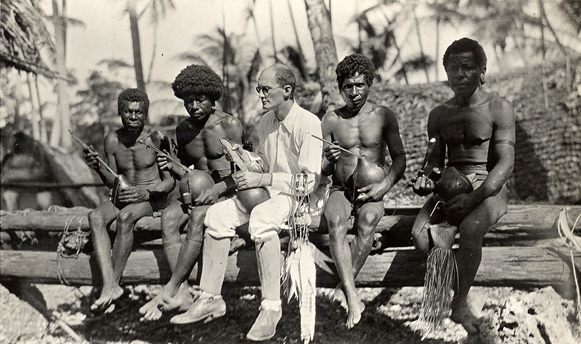|
PATRIARCHY VS MATRIARCHY (Homayoun Shahri, Ph.D., M.A., LMFT)
Patriarchy and matriarchy are defined in terms line of inheritance. In patriarchy inheritance is transmitted from father to off springs, but in matriarchy inheritance is transmitted through blood relationships. Thus in a matriarchal system off springs inherit from their maternal uncle and not from their father. Branislaw Malinowski, a prominent anthropologist, lived among and studied natives of Trobriand Islands (near the eastern coast of New Guinea), a matriarchal society on the verge of transformation to patriarchy, during the first decade of the 20th century. His observations were astonishing. He observed a very peaceful, loving, and friendly people. Children's sexuality was not repressed by parents or the society, and they engaged in sexual activities from a young age, and to the surprise of Malinowski very few native girls got pregnant before the start of eloping with a man. By the age of 20 to 25 the native men and women usually would settle with one partner and the woman would move to the man's house, and their elopement started. They would live together as long as there was love between them. Men usually collected fruites, roots, and planted various crops such as yams and taro roots, women took care of children and household matters. Part of man's annual collection of roots and fish, etc would go to his sister (his blood relative). If the couple fell out of love neither would suffer any economic consequences, as the woman was supported by her brother, and man could support himself. They would just separate and find anther suitable partner. Children would stay with their mother, as the role of father was not known to the natives. There was not economic advantage to remain eloped. Margaret Mead in her book, "Sex and Temperament in Three Primitive Societies", gave similar accounts to those that Malinowski described in his field work and studies of the natives of Trobriand Islands. Malinowski observed that Oedipus complex did not exist in this society (experience during Oedipal period did not result in Oedipus complex) and hypothesized that perhaps Freud's assertion regarding Oedipus complex might not have been as ubiquitous and universal as he claimed. This indicated to Malinowski, and later confirmed by Wilhelm Reich that it is the sexual repression of children, and the charged sexual environment within the patriarchal family that may result in the Oedipus complex, as Freud conceived of and discussed in his writings. Accumulation of wealth was not possible in this society as the food that they produced was very perishable and had to be consumed quickly, same for game and fish that they hunted and caught. This society was essentially a hunter-gatherer society. This society was very egalitarian and there were no hierarchies present in the society had it not been for the existence of the chief. Fathers generally were very friendly to their children and sons, but the role of maternal uncle was more of a what we know as a father in our society. Stealing, violence, sexual assault, and other antisocial behavior were non-existent in this society. Trobriand Islanders had a chief. Chief would collect a small portion of all production and keep it for emergencies. What he collected would be consumed in a ceremony and feast, in case no emergency condition arose. That made the chief somewhat richer than the rest of the society. The chieftain realized that if his son eloped (married) their sister's daughter then wealth would remain withing chief's family, due to the nature of inheritance. Thus the chief kept his son abstinent and his sister kept her daughter abstinent. Malinowski recorded that all the antisocial behavior was limited to this group! The transition to patriarchy began when man started cultivating crops such as wheat which could be stored and kept for a relatively long time. Thus the man who cultivated more wheat and similar crops became richer. In order for him to keep his wealth in his family he probably used a similar strategy as the Trobriand chieftain, thus keeping his sons and daughters abstinent. As the number of these rich farmers grew their sons had to marry daughters of other rich farmers. This is how the concept of dowry started. Thus now there was a price placed on the woman (in the form of dowry) so that only another rich farmer's son could marry the woman of status, and not an average member of the society, hence started the objectification of women. Of course the girl had to be kept abstinent as well so that wealth does not dissipate among commoners. Of course keeping boys and girls abstinent required authority, and discipline. This was the genesis of patriarchy, and authoritarian system of governance, the formation of marriage and later the state. Friedrich Engles in his book, “Origins of private property, family, and state”, also confirms what Malinowski had observed, albeit with some minor differences. Wilhelm Reich, an associate of Freud, who was influenced by Malinowski formed Sexual-Political Organizations which he called “SexPols” right around the rise of Nazi's in Germany. He would educate teenagers about sexuality (what is done in High Schools today), and would provide contraceptives to them. At its peak, SexPols had over 40 thousand members across Germany. He documented that not even one SexPol member gravitated to Nazi ideology. From his experiments, documented in his books (SexPols, and Mass Psychology of Fascism, among others), he postulated that fascist and authoritarian regimes appeal to the most repressive and anti-sexual aspects of the patriarchal family (apparent in Nazi slogans). Is it then surprising that most religions as well as authoritarian systems have an anti-sexual nature, and promote marriage (in traditional loveless sense), are against choice for women, and support objectification and subjugation of women? Where do we go from here? Reich in his book, Sexual Revolution, analyzed some reforms that were implemented early in the former Soviet Union (around 1920s which were all retracted when Stalin rose to power). These included abolition of marriage, declaring that children are property of state, meaning that their well being is guaranteed by the state. Women are also property of state (as men always were), and thus cannot be exchanged with and for money (dowry), nor can then abused. These reforms, according to Reich were very successful. I believe we can learn from these experiments, and implement them in our society, if are to live in a peaceful society which is connected with nature, does not destroy mother earth for profit, does not repress its children (sexually and otherwise), does not wage wars, nor does it exploit its fellow human beings for economic gain, but provides the conditions for a life of pleasure and joy, love and tranquility. References: Branislaw Malinowski – Sexual life of savages. Branislaw Malinowski – Argonauts of Western Pacific. Friedrich Engles – Origin of Family, Private Property and State. Wilhelm Reich – SexPols. Wilhelm Reich – Mass Psychology of Fascism. Wilhelm Reich – Sexual Revolution. Wilhelm Reich – Invasion of Compulsory Sex Morality. Branislaw Malinowski among natives of Trobrian Islands Comments are closed.
|
AuthorHomayoun Shahri Archives
May 2016
Categories
All
|
Ravonkavi Privacy Policy
©2018 Ravonkavi
©2018 Ravonkavi


 RSS Feed
RSS Feed